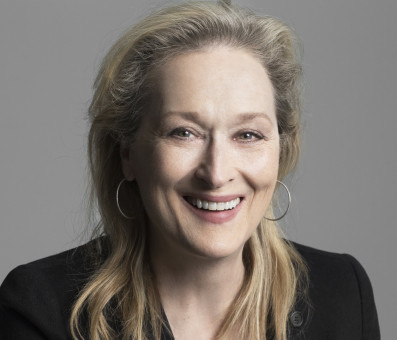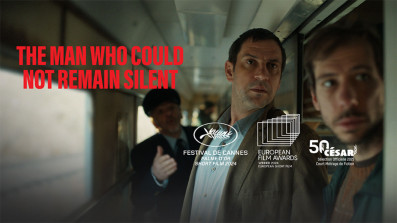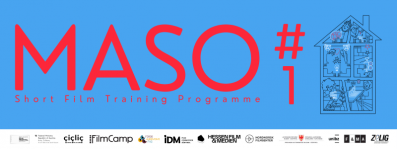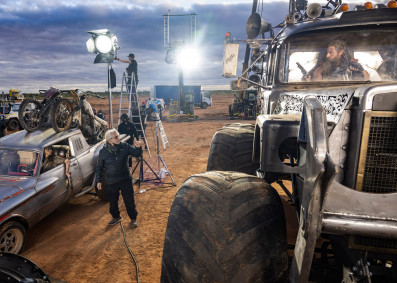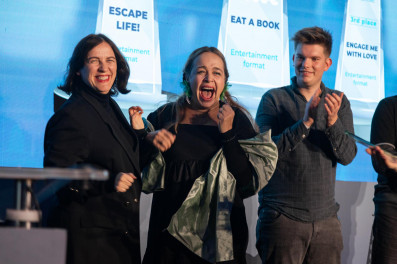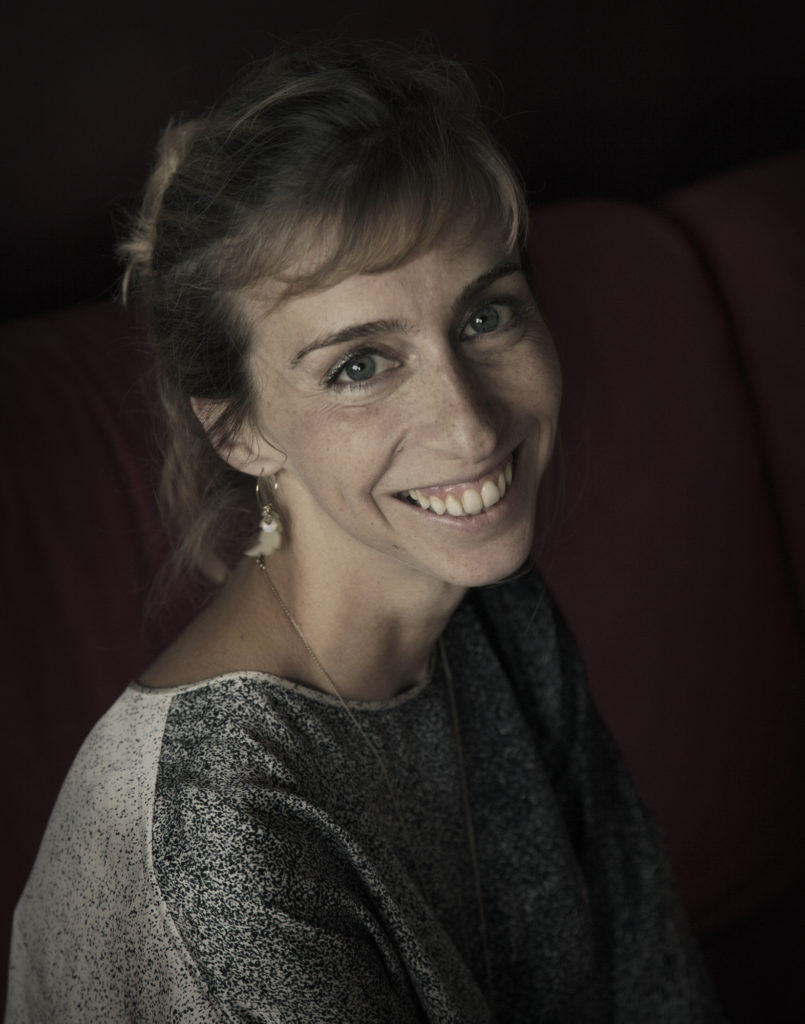
Interview with Mathilde Henrot from Festival Scope Pro platform
Jovana Gjorgjiovska in conversation about Festival Scope, Sarajevo & Locarno Film Festival as well as !"We Are One" initiative
Our collaborator Jovana Gjorgjiovska, from gledaj,mk had a chance to talk with Mathilde Henrot, film industry expert with a rich career an unwavering desire to share her experiences and views. After many years of work as a producer, in 2010 he co-founded the Festival Scope platform, and is also a selector at the film festivals in Sarajevo and Locarno. The reason for our conversation was Matilda's involvement in the programming for the "We Are One" initiative as a representative of the Locarno festival, but we also talked about the other professional engagements she has, as well as the impact of the Pavid pandemic. -19 over the film industry.
JGj: For starters, let’s talk about the ‘We Are One’ initiative. It didn’t only offer a new approach towards the execution of film festivals, but also brought together many festivals which usually compete with each other. How would you personally describe the idea behind the initiative?
MA: “We Are One” started like a very beautiful and noble idea which brought together the partaking festivals. The Tribeca Film Festival team initiated and organized the whole event. For me personally, “We Are One” is leaning more towards some sort of a communication event, rather than a typical film festival. There is a big difference between an initiative that’s bringing together some of the biggest festivals and their diverse program offerings, and the film festivals which, due to the COVID-19 crisis, had to cancel their yearly physical editions and completely move online. For me, this initiative is a good idea and it attracted a lot of attention towards the festival world. I also hope it raised enough donations. Still, it’s quite far from the program of a traditional festival.
How would you describe the process of developing the global programme of ‘We Are One’, in which you participated as a representative of the Locarno Film Festival? Was there a specific message or a goal which guided your decisions?
There was a rule for all festivals - we all had to present content with a maximum length of 4 hours, which had to be accessible all over the world. There was no space for exceptions, totally contrary - the goal was for all offerings to be available everywhere. Knowing the films’ usual business model which is based on selling rights, the main factors which define their success are time and space. Due to this, for us it was very, very hard to find feature length films which could be available globally on YouTube. Among the options we considered were some new films which premiered at Locarno last year, have been to a few festivals and are still aiming to get to as many festivals as possible. But if we had put those films on YouTube, there wouldn't be a festival which would include them in their program. Another option were, of course, the classics, which are either forgotten (usually due to good reasons, but maybe not always) and for them you could still get the rights, or they are not forgotten and the distributors own the rights. So, even though it is technically possible to make geographic blocks with different program offerings, the Tribeca Film Festival team decided not to implement that model. From Locarno’s point of view, we chose to include two excellent master classes which, in our opinion, are very timely and relevant for the initiative “We Are One”. The first one was with the actor Song Kang-Ho (the main character in “Parasite”, who won the Excellence Award at the 2019 edition of the festival) and the director Bong Joon-Ho, moderated by Olivier Pere (who, in recent years, was the artistic director of the festival). The second masterclass was with John Waters in honor of his Award for lifetime achievement, moderated by Albert Serra.
Few weeks after the first edition of “We Are One”, what are your current impressions? How was the idea accepted by film professionals and audiences across the globe?
Generally speaking, I think a good side of the initiative was the fact it reminded everyone what exactly a film festival is and what kind of work the film professionals do. It gave everyone a broader international overview of the work film festivals do, which might not be completely known to the regular audience. For us it wasn’t too stressful, but the Tribeca team took most of the responsibilities. If we look at things from another perspective, the Locarno Film Festival has just launched a new initiative (titled “Films After Tomorrow”) which requires much more effort from our team. Compared to “We Are One” which is a great initiative and our tasks were relatively simple, “Films After Tomorrow” requires much more work and energy from us, because it directly supports the production of selected films that were negatively impacted by the COVID-19 crisis.
Before we move to Locarno’s new initiative, my last question about “We Are One”: in your opinion, could we expect another edition of the initiative in 2021 (even if the COVID-19 crisis is largely under control)?
Why not, though I doubt it will happen at the same time as the Cannes Film Festival :) I expect a lot of it to depend on how much festivals are satisfied by the first edition. Of course, it will be also a question of competition - how will one film festival be better than the rest?! Knowing that the whole initiative was sponsored by YouTube, I assume the Tribeca team will be interested in a second edition. You know how it works with the festivals - if you can convince one of them, it becomes easier to convince the rest by telling them who else you have on board. This year the Tribeca team had excellent timing - when they contacted us, we still didn’t know if we’d be able to go ahead with the 2020 edition in Locarno.
Let’s move to your work at the Locarno Film Festival. The festival itself might be a bit smaller than other festivals, but it’s highly relevant for film lovers and film professionals alike. Taking into account that you took up the selector role in 2019, have one ‘traditional’ edition under your belt and this year you had new tasks related to the initiatives we discussed previously, how does this part of your career look like so far?
The Locarno Film Festival has a very strong connection with its audience which is a really important part of its strategy. I visit Locarno every year during the festival, together with Alessandro with whom I co-founded the Festival Scope and Festival Scope Pro platforms. Since their foundation, about 10 years now, we have had a partnership with the festival, so I know Locarno really well. It’s a huge satisfaction to be a selector and the experience has been great so far. You get the opportunity to watch many films. Some of them are extremely bad, some only a bit bad, some confusing, for some you’ll make a mistake and you’ll debate with your colleagues… In general, watching films is a great job. The hardest part of the selector’s role is the moment before pressing ‘play’: you need to be ready to discover a great film, even though you have seen many films before. You shouldn’t have high expectations, your heart and mind should be open.
I’m extremely happy that I got invited to be a selector, the team working on this is excellent. Although we don’t always agree on everything, our discussions are constructive. This year was special, because it’s not the same to debate about finalized films and ongoing projects. Of course, all of us come with our own networks resulting from our long careers in the film industry, all of us have different tastes. The artistic director Lili Hinstin is great at what she does, not only because she has a very strong film background, but also because she takes risks which is very important for a film festival. She has a clear overview of the important trends and topics in the film industry and we are all happy to work with her.
What are your expectations of the ‘Films after Tomorrow’ initiative?
It’s great that we have access to these projects so early in their development. In our work we usually get a chance to see the films after they are finalized, as fully packaged products. Sometimes we hear of some films before that, so we can follow their work. With the new initiative we have a great opportunity to prepare for the next festival edition, because not only we can follow the selected projects, but also all other projects which applied within the deadline. Many of the applications are timely and relevant, and we’d like to follow their work, even though they were not selected. We would still like to watch them and maybe include them in next year’s selection.
I’d also like us to briefly discuss your work on the Sarajevo Film Festival, which is quite unique among the festivals of the Balkan region, but also in wider Europe. You have been working as a selector of the ‘KinoSkop’ programme of the SFF, so how would you compare the festival to other ones you have attended?
My work as a selector for the SFF is great, we have great collaboration with the rest of the team. Sometimes you get to see films which maybe suit some other selections more, so you’d like to share the idea with the people responsible. The whole team is excellent and the festival by itself has two great advantages over other festivals. First, its fascinating history which is the main reason many film professionals want to visit Sarajevo and to find out more about the symbolism behind the SFF in its beginnings and now. The second one is that many film professionals often come back to Sarajevo, because they like the festival.
The SFF manages to bring many people together, while the programme itself is not too rigid so you can freely network around. During this COVID-19 period, I see many festivals trying to recreate the festival atmosphere not very successfully because live interaction is irreplaceable. I don’t know what will happen within the film industry if there’s ever again such a crisis, it’d have huge negative effects… This is an industry for which it’s necessary that people come together in real life during the festival. It’s not about selling carpets or apartments, but about long-term building of partnerships and sharing experiences.
Having in mind that we have yet to deal with the crisis consequences and we’ve already seen the negative effect on the film industry, I’d also like to know your opinion about the different decisions made by film festival teams. Some of them decided to build whole new digital platforms almost from scratch, but there were also some that have decided to completely cancel their 2020 editions. In your opinion, what would a decision to ‘skip the year’ mean for a festival?
The decision itself means a few things, among which the main one is that the festival can afford that! Not all festivals can afford it, some know it’s essential they have an edition every year, because their finances depend on delivery of the planned activities. If you get finances every year in order to organize a festival and this year you decide to ‘take a break’, what would that mean for your finances? Would you get a bigger budget next year or would that have a negative effect on your plans? Organizing an online edition of a festival is not an expensive thing - yes, it asks for certain resources and it has a price tag, but it’s easily doable for many festivals, even for the smaller ones.
The second possible meaning of a decision to skip a festival edition is the question about significant expectations and effects on the commercial value of the selected films, as is the case with the Cannes Film Festival. Under normal circumstances, when a film premieres in Cannes, the production expects certain finances from the sales and distribution of the film. Of course, there are some beliefs that once a film is available online, it’s not simple to control who can access it, where, in which format. On the other hand, when you screen a film in a cinema, there’s a limited number of people who will see it. So now you have to ask the question - how does this influence the production houses and the distributors?
Finally, the third possible meaning of a decision not to organize an online edition of a festival is that the team behind it is conservative! Many festivals decided to go online and yes, no one wants to organize an online edition with lesser value than the festival’s physical edition. Many expected that the big production houses, such as those in the USA, would be against online release of their films, but current practices prove otherwise.
As you have mentioned before, 10 years ago you co-founded the Festival Scope platform, which recently got divided into FestivalScope for the film lovers and Festival Scope Pro for the film professionals. How did the COVID-19 pandemic affect the platforms? Are there any differences between how the general public and the film professionals use the two platforms?
There were many interesting reactions for both platforms! Because Festival Scope Pro is for the film professionals giving them access to big festival films, the pandemic had very negative effects - we simply didn’t have any new films which we could include in the offer. On the good side, we were approached by a few smaller festivals, so we try to direct the film professionals’ attention to these festivals which usually don’t get much attention.
On the other hand, we had a very interesting period for Festival Scope - many of the festivals wanted to be included on the platforms, but we couldn’t do that. So we came to an agreement with a new platform called Shift 72, where the festivals can show their films. This had a great start and lots of audience interest. The whole COVID-19 situation had both positive and negative effects on the two platforms, but also on the whole film industry.
As a final question, what are your expectations regarding the film industry in the upcoming year, while we’re learning how to deal with the COVID-19 crisis effects?
To be honest, I hope the whole industry won’t shrink too much. I want to be optimistic, but I don’t know how possible that is. My business works online, but I’d be very sad if the cinemas remain closed. The experience of watching a film together in a cinema is extremely valuable, completely different from watching a film at home. When you go to a cinema, you usually go with a close person in order to discover a whole new world, there’s this sense of adventure and bravery. When you are at home in front of your computer, that’s very close to reality. With COVID-19 we saw another perspective - film lovers started researching more actively and discovered new films online. In the first few weeks Netflix had the main say, but then people started to search for new and different film experiences, especially the people who usually go to a cinema or to festivals. I think there’s a big appetite and curiosity for discovering new films in cinemas, we just need to learn how to live with the risks. The first numbers in France offer very little hope, but we will see how the next COVID-19 measures affect the whole situation …
Written by: Jovana Gjorgjiovska



